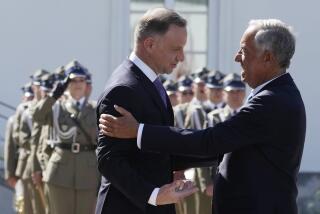Soviets Sow More Seeds of Content Over Europe
- Share via
ROME — Soviet General Secretary Mikhail S. Gorbachev scored another public-relations triumph last month when he declared in Prague that the Soviet Union had stopped the production of chemical weapons and was building a factory to destroy those it already had. Although one of the objectives of the current Soviet peace offensive is to reassure Western Europeans, the announcement was nonetheless unexpected. And it may be followed shortly by a more comprehensive Soviet proposal.
Gorbachev’s initiative underscores two conflicting tendencies emerging in regard to chemical disarmament. Negotiations at the multilateral conference on disarmament in Geneva, on the one hand, have been making real progress during the past year. Agreement on a treaty that would impose a worldwide ban on chemical weapons could be reached soon.
On the other hand, following arms-control initiatives that Soviet leaders have taken these last months in rapid succession, Moscow may soon propose the elimination of U.S. and Soviet chemical-warfare weapons in Europe, from the Atlantic to the Ural Mountains. Such a move would not surprise the restricted circle of analysts who follow the issue on this side of the Atlantic. Plainly, there is a strong political incentive for the Soviets to take confidence-building initiatives.
What would they gain, or lose, in proposing a chemical weapons-free Europe? They would free Western Europeans from the horrible fear of chemical weapons, thus scoring a strong point in their psychological peace offensive. They would probably stop, at its onset, the U.S. binary nerve-gas program, approved by Congress two years ago and essentially conceived for deployment in Europe. And they would lose no real military advantage, because the massive use of chemicals against an adversary who has a powerful nuclear retaliatory arsenal, as is the case with the North Atlantic Treaty Organization, appears a dubious option.
The prospect of protracted chemical warfare on European soil, more particularly German soil, is hardly one Europeans can face calmly. The Pentagon has estimated there could be up to 12 million civilians casualties in 24 hours of chemical warfare in Europe. The Soviet Union is estimated to have about 300,000 tons of nerve agents, although nobody can verify that because chemical warfare intelligence collection has been given a low priority by Western intelligence services.
In any event, to face the Soviets, the current U.S. holdings are estimated at some 30,500 tons of nerve agents and older mustard gas stockpiled at eight locations in the United States, one large depot in West Germany and one on Johnston Atoll in the Pacific west of Hawaii. The real concern, from the point of view of possible chemical warfare in Europe, is the U.S. supply already on hand on the Continent. It consists of 6,500 tons of nerve gas artillery ammunition under sole U.S. control in West Germany--ammunition that, contrary to widespread belief, is fully serviceable. This stockpile is to be replaced by more efficient binary nerve-gas weapons, which utilize two relatively harmless substances that become deadly nerve gas when combined.
Western European governments, backed by overwhelming public opinion, are most reluctant--with the exception of France--to engage in chemical rearmament or to accept any new chemical weapons. That is why a Soviet proposal for eliminating chemical weapons in Europe would get a favorable reception in Western--and Eastern--Europe.
NATO would require that any agreement be backed up by adequate verification. But the Soviet government has changed its attitude and has repeatedly said in recent months that it would accept verification of removal, transport, stocking and destruction of these weapons.
A most important question remains: What about the rest of the world? No doubt by far the largest stocks of chemical weapons are in Europe. But they have not been used in Europe for seven decades--not even during World War II. They have beyond doubt been been used, however, in the Iran-Iraq War. There have been allegations that a number of Third World countries have used chemical weapons in recent years--in Afghanistan, for instance, against the resistance; by Nicaraguan forces against the contras , by the Vietnamese against the Khmer resistance, by Angolan forces against the Unita insurgents, by Indonesian troops in East Timor. However, no international authority has been able to state whether any such reports are true or false.
Which is, then, the higher objective at stake? To eliminate chemical weapons from Europe, or to secure--after more than 15 years of negotiations in Geneva--the acceptance of a worldwide ban, which now appears to be almost in sight? The two objectives are not contradictory. Yet many arms-control observers believe that a regional agreement in Europe would jeopardize, for an unforeseeable period, the chances of binding several reluctant Third World governments to the non-use of these horrible and yet relatively cheap weapons.
More to Read
Sign up for Essential California
The most important California stories and recommendations in your inbox every morning.
You may occasionally receive promotional content from the Los Angeles Times.










